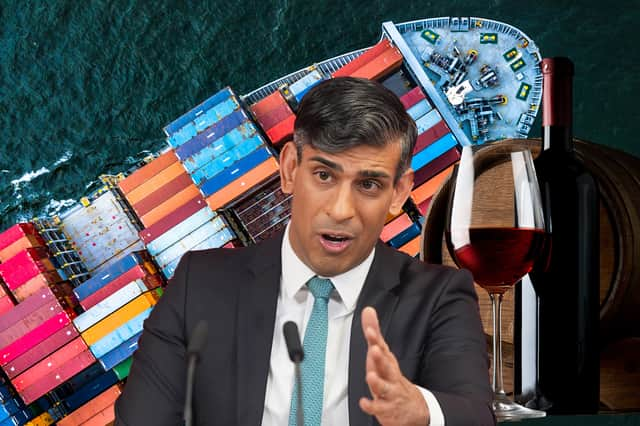Post-Brexit trade deals have made selling wine abroad ‘more difficult and expensive’, Wine Society CEO says
and live on Freeview channel 276
Instead of being a real benefit, post-Brexit trade deals have made selling wine abroad “more difficult and more expensive”, the chief executive of the Wine Society has said.
Steve Finlan slammed the government for being completely “out of touch with business”, over complex new duty changes which are set to hit the industry next year. The Treasury was warned that plans to tax alcoholic drinks by alcohol strength as opposed to type would be “unworkable” and push prices up, however it is pressing ahead.
Advertisement
Hide AdAdvertisement
Hide AdTreasury minister Gareth Davies recently revealed that the post-Brexit changes would come into force on 1 February 2025: “I recognise completely that a shake-up of a system that has existed for more than 140 years will raise some eyebrows and cause change for a number of businesses, but we should be confident that the bureaucratic burden under the new system is manageable.”
Finlan told NationalWorld: “Governments always talk about listening to business, clearing red tape and making it easier to do business. Their approach to the wine industry has been the entire opposite and the recent statements by Gareth Davies simply illustrate how out of touch they are with business.”


He said any benefits from post-Brexit trade deals had been wiped out by other legislation, such as the duty rates and environmental laws. “The best example is the Australia trade deal which was heralded as great for wine, but in reality is becoming more difficult and more expensive,” Finlan explained.
Brexit had “made things more difficult and impacted work and speed”, Finlan said. He added: “This has been manageable and I would not overstate Brexit as a constraint on businesses importing wine. The position on export is very different and, although we do not export, we are aware of the hoops that businesses are having to jump through.”
Advertisement
Hide AdAdvertisement
Hide AdBut his main ire was aimed at the duty changes which are set to come in next year. The proposals, first announced when Rishi Sunak was Chancellor following Brexit, would see the amount of duty paid rise by 2p per 0.1% increase in ABV.
Given various varieties of wine all have different alcohol volumes, these tax changes could be very complex for producers and distributors. The government initially put in place an 18-month easing in period, whereby all wines with 11.5% to 14.5% ABV would pay the 12.5% duty rate.
“The planned duty rates are unworkable and I have been quoted before as calling them ludicrous,” Finlan said. “This is government at their worst – telling us they are listening when in fact they are refusing to listen.”


He said the Wine Society, the world’s oldest member-owned community of wine lovers, sells more than 4,000 different wines each year. Sometimes different batches of the same wine will have differing alcohol strengths. “The bureaucracy around this will be unworkable for us and could very well put small independent companies out of business,” Finlan warned.
Advertisement
Hide AdAdvertisement
Hide AdAhead of the general election, he urged both Sunak and Keir Starmer to listen to the industry. Take out friction, make life easy and stop suffocating the wine industry,” said.
“Duty is high, returns to the Treasury are diminishing and the cost and complexity of doing business is rising at unacceptable levels. It is easy to reverse this decline – listen to the industry.”
The Wine and Spirit Trade Association also hit out at the duty changes, saying they have been described by its members as “un-administrable” and “sheer lunacy”. WSTA chief executive Miles Beale said: “Consumers need to recognise that price increases exclusively for the UK’s most popular alcoholic drink are baked in, are going to be substantial and are being imposed by this Sunak government.
“Cutting red tape should surely be a priority for the Tories, who often cite it as a ‘Brexit benefit’. We are not asking for further reform, we are merely calling on the government to retain the existing, simplified procedure for taxing wine to avoid what is going to be a very costly mistake.”
Advertisement
Hide AdAdvertisement
Hide AdBeale believes that the changes will push the price of 75% of red wines up, due to their higher alcohol content. While further analysis from the WSTA estimates that 43% of wines will go up in price. He said the changes “would be much more than a one-off cost and that it would push up prices for hard pressed consumers – with negligible or no revenue benefit for the Exchequer”.
A government spokesperson said: “We work closely with Wine GB and the industry to identify more opportunities to export our award-winning wines across the world, and the industry remains a priority for us when negotiating trade deals.
“We’re also backing the UK’s wine industry by freezing alcohol duty for another six months to 1 February 2025, meaning duty is 10p lower on a bottle of wine than it would have been had the planned increase gone ahead.”
Ralph Blackburn is NationalWorld’s politics editor based in Westminster, where he gets special access to Parliament, MPs and government briefings. If you liked this article you can follow Ralph on X (Twitter) here and sign up to his free weekly newsletter Politics Uncovered, which brings you the latest analysis and gossip from Westminster every Sunday morning.
Comment Guidelines
National World encourages reader discussion on our stories. User feedback, insights and back-and-forth exchanges add a rich layer of context to reporting. Please review our Community Guidelines before commenting.
